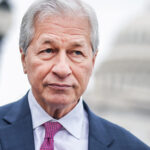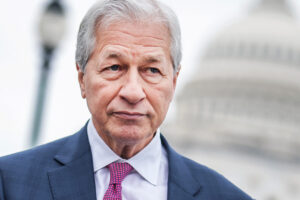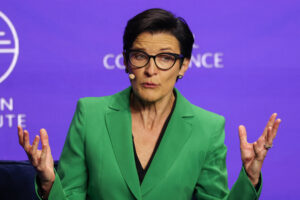
Bloomberg
South Korea Halts Aid For Coal Power Plants: Climate Update
(Bloomberg) — President Joe Biden’s climate summit has drawn 40 heads of state including China’s Xi Jinping, Vladimir Putin of Russia and Boris Johnson from the U.K. The two-day virtual event kicked off Thursday and will include corporate executives, union heads, Pope Francis and Bill Gates.The stakes are high. While Biden is seeking to reestablish the U.S. as a major player on the climate stage, he’s facing skepticism from other nations after President Donald Trump reversed key environmental policies.Click here to see schedule of events for two-day summit“No nation can solve this crisis on our own,” Biden said Thursday from the White House at the opening of the event. “All of us, and particularly those of us who represent the world’s largest economies, we have to step up.”South Korea Curbs Financing for Overseas Coal Power (3:08 p.m.)South Korea is halting state financing for overseas coal power plants, President Moon Jae-in said during the summit.The country has already halted construction of new coal plants within its borders, and Moon is now seeking to slow global demand for the dirtiest fossil fuel. He also expects to announce this year a new, more ambitious target for reducing South Korea’s carbon emissions. South Korea got 40% of its electricity from coal in 2019, according to BloombergNEF.“To become carbon neutral, it’s imperative for the world to scale down coal-fired power plants,” Moon said during the summit.Pentagon Chief Calls Climate Change ‘Destabilizing Force’ (3:01 p.m.)U.S. Secretary of Defense Lloyd Austin tied the climate crisis to global security.“We face all kinds of threats in our line of work, but few of them truly deserve to be called existential. The climate crisis does,” Austin said. “No nation can find lasting security without addressing the climate crisis.”Austin described climate change as a “destabilizing force,” which intensifies competition for resources and increases the risks of displacement and famine. “As families risk their lives in search of safety and security, mass migration leaves them vulnerable to exploitation and radicalization,” he said.The Department of Defense has been impacted, Austin said. He cited billions of dollars of damage at Tyndall Air Force Base in Florida at the hands of Hurricane Michael, as well as damage to Offutt Air Force Base as a result of severe flooding of the Missouri River.Buttigieg Vows More Work on Fuel Emissions Soon (1:31 p.m.)New U.S. standards limiting auto emissions will be coming soon from the Biden team to rework some of the rollbacks under the Trump administration, according to U.S. Transportation Secretary Pete Buttigieg.The transportation sector is responsible for nearly 30% of greenhouse gas emissions in the U.S. and, despite President Joe Biden’s emphasis on boosting use of electric vehicles, more stringent rules are still needed on existing gas-powered models.“That’s why we’re not only trying to drive electric vehicle adoption but also continue pursuing robust standards in terms of the emissions of internal combustion engines,” Buttigieg said in an interview with Bloomberg Television on David Westin’s Balance of Power on Thursday. “They’re not going away over night.”Buttigieg said the U.S. “can’t let down our guard down on fuel emissions standards and you’re going to be seeing more from that from us soon,” pursuant to Biden’s Day 1 order to look at the rules and regulations his administration inherited from former President Donald Trump. Trump relaxed federal fuel-economy standards for automakers and sought to limit states from enforcing tougher rules.Citi Says Clients Need to Transition to Net Zero to Fight Climate Change (12:36 p.m.)Citigroup Inc. Chief Executive Officer Jane Fraser said her bank, which was the third-largest financier of fossil-fuel companies last year, will focus on bringing clients along on the bank’s own commitment to achieving net-zero greenhouse-gas emissions in its financing activities by 2050.Most banks have decided to stand by clients that are major emitters of carbon despite calls from climate activists urging lenders to cut them off. Many banks including Citigroup, have instead developed teams to advise clients on how to reduce their impact on climate.“We know that to truly fight climate change, our clients, which include many of the biggest world multinationals as well as investors and countries like the ones we’ve heard from today will also need to transition to net zero,” Fraser said. “And we will join them on this journey. Net zero is very easy to say but it’s going to be hard to do. Make no mistake about this, this is going to be really hard.”Brazil Vows to Curb Deforestation of Amazon Rainforest (12:05 p.m.)Brazilian President Jair Bolsonaro said Brazil will reduce emissions 30% by 2025 and 43% by 2030. He also vowed to end illegal deforestation by 2030, a feat that would increase its possible CO2 reduction nearer to 50%, he said.“We must face the challenge of improving the lives” of Brazilians living in the Amazon region, Bolsonaro said through a translator. He called for “truly acknowledging the value of the standing forests and biodiversity,” he said. “There must be fair payment for the environmental services provided by our biomes to the planet at large as a way to recognize the economic nature of environmental conservation activities.”With the world’s largest area of tropical forest, Brazil has a uniquely influential role and responsibility among nations to maintaining system health. Its forests take in an enormous quantity of the world’s carbon pollution every year. So keeping those forests in tact is critical to achieving overall goals. Bolsonaro has said that the forests belong to Brazil, not the world. A previous high-profile effort, established by governments and businesses in 2014, to halve illegal deforestation failed spectacularly last year. Brazilian tree-loss in 2020, despite the pandemic, jumped 25% over the previous year.A new scientific analysis published last month found that the Amazon may already have passed a critical threshold, becoming a net contributor to climate change, instead of a brake on the heating.New York Threatens to Sue Oil Companies Over Gasoline’s Impact (11:40 a.m.)New York City has filed suit against the American Petroleum Institute and some oil companies, alleging they violated the city’s consumer protection law and misled the public about the environmental impact of using their gasoline.Mayor Bill de Blasio said the lawsuit would be based on an argument similar to litigation that’s been successful against cigarette and opiate-producing companies, accusing them of misleading consumers about the health consequences of using their products. The city was one of the litigants against “Big Tobacco,” the mayor said.“There was a lot of success in court arguing that the advertising, the conscious effort to mislead, these companies specifically have aggregiously broken our laws when it comes to addressing consumers,” de Blasio said during a Thursday briefing.API did not immediately respond to a request for comment.Plaintiffs on the case include Exxon Mobil Corp., Royal Dutch Shell Plc., BP Plc.U.S. Pledge Said to Fall Short of U.K., EU (11:40 a.m.)Biden’s new commitment to cut U.S. emissions in half over the coming decade from 2005 levels, with an aim to zero out planet-warming gases in the next 30 years, is the most ambitious climate goal yet by an American leader.Yet it isn’t the most far-reaching goal on the international stage, coming in behind the U.K. and the European Union. And it’s unlikely to prove sufficient to keep average global temperature rise below 1.5°C, according to nonprofit Climate Action Tracker.Before Donald Trump pulled out of the Paris accord, the U.S. had set a target to cut emissions by about 26% by 2025 from 2005 levels. Maintaining that trajectory would mean a roughly 34% reduction by 2030, according to the energy research group BloombergNEF. Biden’s new emissions goal raises that ambition by about a third.But to avoid 1.5°C of warming, according to Climate Action Tracker, the U.S. would have to set a 2030 target of more than 57% relative to 2005 and help developing countries to cut emissions.Green Group Dump Cow Manure at White House (11:22 a.m.)Some environmental activists left little doubt about their disdain for Biden’s climate pledge on Thursday. They dumped cow manure near the White House in protest.“Biden’s 2030 Plan = Mass Death,” the group Extinction Rebellion D.C. proclaimed as activists pushed pink-painted wheelbarrows of manure on sidewalks blocks from where Biden declared his promise to pare U.S. greenhouse gas emissions 50% to 52% from 2005 levels by the end of the decade.Yet the group’s reaction wasn’t shared across the spectrum of environmentalists. Several large climate organizations, which spent months pushing the U.S. to commit to halve its greenhouse gas emissions, cheered Biden’s commitment.“With this ambitious and credible target, the U.S. has joined the European Union and U.K. at the top of the global league table, recaptured a leadership role on climate and positioned itself to push for greater global ambition in the lead up to COP26 in Glasgow,” said Nathaniel Keohane, senior vice president for climate at the Environmental Defense Fund.Mitchell Bernard, president of the Natural Resources Defense Council, said Biden was “leading by example” by putting forward a pledge that “rises to the urgency of the task” and is “ambitious, yet achievable.”However, environmentalists were far less sanguine about modest promises of action from other world leaders, including the heads of India, China and Australia. Despite stressing the need for global collaboration to combat climate change, China’s Xi Jinping didn’t announce new goals for scaling back the country’s greenhouse gas emissions.“The core message from today’s speech is China will peak coal consumption by 2025, which is modest,” said Li Shuo, a climate analyst with Greenpeace East Asia. “More ambitious actions are needed” and “it is in China’s self interest to announce and implement further plans ahead of COP26.”IMF Proposes Carbon Price Floor for Largest Emitters (11:25 a.m.)The International Monetary Fund proposes establishing a carbon price floor for the largest emitters, such as the Group of 20 nations, to cover as much as 80% of global emissions, Managing Director Kristalina Georgieva said.A price floor would need to be pragmatic and equitable, with different pricing for countries at different levels of economic development, Georgieva said in remarks prepared for the U.S. White House climate summit. It could be implemented through carbon taxes, carbon trading systems or equivalent measures and would avoid less efficient and contentious border carbon adjustments, she said.A robust price for carbon has proved to advance investments in renewable energy, electric transportation, energy-efficient buildings, reforestation and other climate friendly activities, while boosting growth and jobs and reducing emissions, Georgieva said.IMF analysis shows that without a robust carbon price, the world won’t reach its climate stabilization goals, Georgieva said. The fund also estimates that a mix of steadily rising carbon prices and green infrastructure investment could increase global gross domestic product by more than 0.7% per year over the next 15 years and create millions of new jobs.“Carbon pricing is gaining momentum,” Georgieva said. “Many businesses now use a shadow carbon price in their models. Over 60 pricing schemes have been implemented. But the average global price is currently $2 a ton, and needs to rise to $75 a ton by 2030 to curb emissions in line with the goals of the Paris Agreement.”The IMF also urges standardized reporting of climate related financial risks and delivering $100 billion a year in climate finance to the developing world, combined with technology transfer and policy support to decouple growth from carbon emissions.Putin Vows to Cut Emissions ‘Significantly’ (11:00 a.m.)Russia President Vladimir Putin pledged to “significantly” reduce his country’s cumulative net emissions over the next three decades. Earlier this week, he said that the total volume of net emissions from Russia should be less than those released from the EU over the next 30 years.Also See: Putin’s New Climate Goal is a Lot Less Ambitious Than it Sounds“It is no secret that the conditions that facilitated global warming and associated problems go way back,” Putin said. “Carbon dioxide can stay in the atmosphere for hundreds of years. So it’s not enough to tackle the issue of new emissions. It is also important to take up the task of absorbing the CO2 that has accumulated in the atmosphere.”Putin stressed that Russia “makes a gigantic contribution to absorbing global emissions, both ours and from elsewhere.” Absorption capacity of Russia’s eco-system is estimated at around 2.5 billion tons of CO2 equivalent a year, according to Putin. Russia currently emits about 1.6 billion tons of CO2 equivalent per year, compared to about 4 billion tons for the EU.Australia Skirts Coal, Stresses Technology (10:38 a.m.)In remarks plagued by technical glitches at the start, Australia’s Prime Minister Scott Morrison appeared to skip over his country’s role as a major coal producer. Instead, Morrison focused on Australia’s efforts to produce new technologies to fight climate change and announced A$1.5 billion ($1.2 billion) in climate financing focusing on the Pacific region.“We want to work with others on the how,” Morrison said. “You can always be sure that the commitments Australia makes to reduce greenhouse gas emissions are bankable.”Poor Nations Call For More Climate Aid (10:19 a.m.)While the U.S.’s re-entry into the Paris deal has been roundly welcomed by developing countries, those nations still face the same old problems. Leaders from developing countries and emerging economies have criticized rich nations’ failure to provide $100 billion of finance that they promised to deliver by 2020 to help them deal with the worst impacts of climate change.Biden didn’t announce any new pledges to increase the amount the U.S. dedicates to climate finance today, despite promising to up his ambition on cutting emissions.China’s Xi highlighted the importance of “common but differentiated responsibilities” — which is a United Nations adage that means the biggest historical emitters should pay the most. Joko Widodo, Indonesia’s President, said developing countries could consider tougher climate targets like net zero, but only if they receive finance & capacity support.Bangladesh Prime Minister Sheikh Hasina reiterated a call for rich countries to deliver the $100 billion goal, which she said should be balanced 50:50 between adaptation and mitigation efforts.Technical Woes Dog Putin, Xi, Macron Speeches (9:45 a.m.)Technical glitches marred the beginning of Biden’s virtual climate summit, proving even the U.S. government is not immune to the computer woes that have bedeviled teleconferences amid the pandemic.All time stamps are New York time.The flubs started early with feedback on the audio feed, creating an echo as Vice President Kamala Harris kicked off the event. A few minutes later, Xi Jinping’s speech was broadcast in Mandarin, with an English translation starting late and without including the beginning of the first speech from an international leader.Emmanuel Macron of France spoke in a pre-taped address in French, but there was no translation until the last part of his speech. Then Russia’s Vladimir Putin was introduced while Macron’s remarks were ongoing. A video display in the White House cut to a shot of Putin, who appeared to consult with aides off-screen and looked puzzled about when to begin speaking. Meanwhile, control-room chatter of technicians indicated a scramble behind the scenes to deal with the gaffe.When Putin concluded, U.S. Secretary of State Antony Blinken recognized the “technical difficulties,” and returned the floor to Macron. But as the pre-taped speech was broadcast for a second time, the English translation again was delayed, cutting off his initial comments.Canada’s Trudeau Pledges to Cut Emissions 40%-45% by 2030 (9:26 a.m.)Canada’s Prime Minister Justin Trudeau pledged to strengthen his country’s climate ambitions by slashing 2005 emission levels by 40%-45% by 2030. Canada is the only Group of Seven nation to see emissions rise since the Paris Agreement was signed in 2015.“Today, Canada is in a position to raise our climate ambition once again,” the Canadian leader said. “Our new climate target for 2030 is to reduce our 2005 emission levels by 40 to 45 % and we will continually strength our plan and take even more actions on our journey to net zero by 2050.”Trudeau is trying to coordinate the northern nation’s climate policy with the U.S. to develop a cross-border approach to climate change. Biden’s increased ambitions put pressure on the prime minister to take a more aggressive approach to slash Canada’s carbon footprint.Tackling Climate Change ‘Herculean Task,’ Merkel Says (9 a.m.)German Chancellor Angela Merkel said she is delighted that the U.S. under President Biden is again helping with the “Herculean task” of tackling climate change.“There can be no doubt that the world needs your contribution if we really want to fulfill our ambitious goals,” Merkel said. “This is a herculean task, because this is nothing short of a complete transformation, a complete change in the way we do business, the way we work.”Merkel reaffirmed Germany’s climate goals, as well as her government’s decision to phase out coal power by 2038 at the latest and invest more in renewables.No Major New Pledges From Xi, Modi at Climate Summit (8:45 a.m.)China’s Xi Jinping and Narendra Modi of India led off the summit by stressing the urgent need for global collaboration to fight climate change, but without announcing any new major goals for curbing emissions.Xi reiterated China’s plans to peak carbon emissions by 2030 and to attain net-zero status by 2060. He also pledged to reduce coal consumption between 2026 and 2030. “We must be committed to green development. Green mountains are gold mountains, to protect environment is o protect productivity,” Xi said.Modi stressed India’s ongoing efforts to install 450 gigawatts of clean energy — policies that the two nations already have in place.Biden has said that a key goal of this summit is to encourage nations to increase their ambitions toward fighting climate change. The U.S. announced its new, bigger target for curbing emissions Thursday. Japan did as well, and Canada announced a new goal Monday.But China, the world’s biggest emitter, and India, the third-largest source of greenhouse gases, are sticking with their current plans, even after visits in recent weeks from Biden’s climate envoy John Kerry, a development that climate advocates may see as a setback for Biden.UN Chief Calls on Nations to Submit New, Ambitious Plans: 8:37 a.m.United Nations Secretary-General Antonio Guterres called on countries, especially major emitters, to submit new and more ambitious plans laying out actions and policies that will align the next 10 years with a “2050 net-zero pathway.”To build a truly global net zero coalition, Guterres said the world needs a breakthrough on finance and adaptation. He called on developed countries to deliver on their pledges to boost public climate finance by coming to the G7 in June with a plan to deliver on a $100 billion climate action fund for developing countries.“Let us mobilize political leadership to move ahead together – to overcome climate change, end our war on nature and build lives of dignity and prosperity for all,” Guterres said.Carbon Price Hits Record in EU Before Summit: 7:24 a.m.A surge in the world’s largest carbon market reflects the cost of polluting for industry just as world leaders prepare for a crucial climate gathering hosted by U.S. President Joe Biden.Prices in the European Union’s emissions trading system has broken records every day this week as European lawmakers reached a deal on stricter pollution targets and investors got a glimpse of how the bloc will set green standards in the future.Japan Pledges Stricter Emissions Target: 5:49 a.m.Japan will strengthen its 2030 emissions reduction commitments under the Paris Agreement, amid an effort to become carbon neutral by the middle of the century.The country aims to reduce greenhouse gas emissions by 46% by 2030 compared with 2013, Prime Minister Yoshihide Suga said Thursday ahead of the global climate summit hosted by U.S. President Joe Biden. Japan had previously targeted a 26% reduction.For more articles like this, please visit us at bloomberg.comSubscribe now to stay ahead with the most trusted business news source.©2021 Bloomberg L.P.










